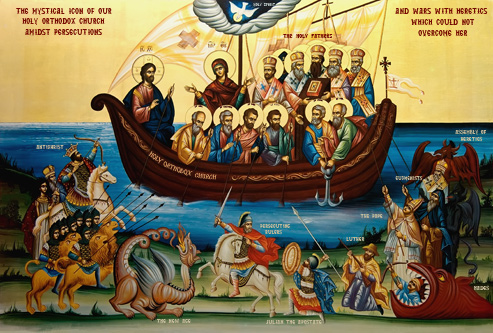From the Pontifical Society of St John Chrysostom:
LEADING Latin Rite Bishop in Ukraine has reported that relations with the Russian Orthodox are getting increasingly warmer. Speaking to Aid to the Church in Need during a visit to the charity’s international headquarters in Germany, Bishop Marian Buczek of the Latin-Rite Diocese of Kharkiv-Zaporizhzhya, Ukraine gave his positive assessment of ecumenical relations in the east of the country.
He spoke of the appointment of Patriarch Kirill as good news for ecumenism – despite the hard-line stance the patriarch has publicly taken since his election. Bishop Buczek said: “Patriarch Kirill knows the Roman Catholic Church very well, he met Pope John Paul II and also met Pope Benedict XVI while chair of the Russian Orthodox Church’s Department for External Relation.
He added: “The relationship between the two churches is getting warmer and warmer.”
The bishop stressed how the diocese has had excellent relationships with Russian Orthodox in Ukraine – when he first came to Kharkiv-Zaporizhzhya, which shares a border with Russia, one of his first moves was to established contacts with the local Orthodox Metropolitan.
In his diocese the Latin Rite Church is a minority – the majority of Christians belong to the Russian Orthodox Church (Moscow Patriarchate) and there are many mixed marriages between members of the two Churches. Bishop Buczek said: “And for this reason we want relationships between the hierarchies to be good, but there is also a sense of unity which comes through mixed Catholic and Orthodox families.” Catechesis classes for Catholic and Orthodox couples who are intending to marry are put on to aid mutual understanding between the spouses of the Catholic partner’s faith. While initially the Orthodox partner may be initially apprehensive, “after the course the Orthodox one says thank you to the priest or nun – as it helps them not only to learn about Roman Catholicism, but Christian faith in general”.
The bishop is also keen to arrange a meeting between Russian Orthodox and Roman Catholic youth. He says this would help them to understand each other better, get to know each other, and help them give common testimony of the Christian faith to those who do not go to Church.
Bishop Buczek paid tribute to ACN for the help it had given the diocese of Kharkiv-Zaporizhzhya, which was erected only seven years ago and covers much of eastern Ukraine. He said: “Since 1991 ACN has supported the Latin Rite Church in Ukraine by building new churches and repairing those churches in need of restoration.” The bishop underlined how the aid is particularly important in eastern Ukraine, which suffered under Communism thirty years longer than western Ukraine. Speaking of the Communist era, Bishop Buczek said: “It was a spiritual desert – by and large there were no priests here for 70 years.” There are 20 million people living in the bishop’s diocese, of which 50,000 are Latin Rite Catholics

